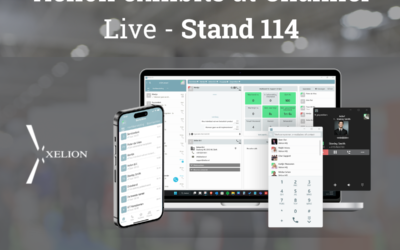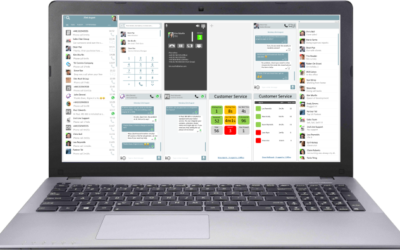
Traditionally there has been a clear divide between the supply and support of IT services and voice telephony. Two distinct channels to the market were established to address the supply of these technologies to customers. But the growth of VoIP technology over the last decade has led to voice and data convergence. However, there is still a clear divide between IT support companies and telephony service resellers. Today the growth of Unified Communications (UC) has fuelled customer demand for one supplier to meet all their business ICT needs. In popular jargon, this provides customers with ‘one throat to choke.’
The provision of cloud-based services is rising because the increased memory storage of centralised data centers and the greater capacity of broadband and Ethernet connections, make it more practical to access business software applications that are hosted remotely, rather than hold them on customer premises hardware.
This trend means that IT support companies must offer external connectivity solutions to their customers as well as internal network support. It is also fuelling the growth in hosted telephony solutions, as customers accept the reliability and benefits of services in the cloud.
Hosted applications have a number of benefits. The need for local storage capacity for both applications and files is greatly reduced. In terms of disaster recovery and business continuity, offsite provision of applications and storage of files is much safer. The growth of cloud services has seen an increase in hosted telephony, where telephony functionality is provided as an offsite service instead of with a conventional phone system housed on the customer’s premises.
But there is still some hesitancy amongst IT channel companies regarding hosted telephony, while voice resellers have fully embraced the technology to the extent that many no longer sell on-premise PBX hardware. Those IT companies that are nervous about voice comms will find that deploying hosted telephony is much simpler than conventional PBX systems and requires considerably less after-sales support as configuring hosted solutions can be done by the customer.
Identifying the service provider
We can see that many hosted telephony vendors have very little control over their own platform which they supply to resellers as they are also reselling the service themselves in their own brand. All resellers should understand who the underlying developer behind a service is, how flexible are they when it comes to partner feedback or feature requests, and who makes the final decisions on both the road map and the final product.
It can also confuse the market and customers, as many hosted products have impressive interfaces and smart features. However, lack the core functionality the customer needs which they don’t realise until the service is installed.
Integration
The key factor is to sell a value-added solution that differentiates you from competitors so you are not just in a race to the bottom on price. Customers now want to integrate the hosted telephony platform with other back-office solutions such as CRM systems. This is why Xelion has open APIs allowing third-party apps such as MS Exchange and Microsoft 365 to be easily integrated seamlessly with the service. This allows our partners the freedom to design bespoke solutions for customers with best-of-breed apps that really meet their requirements, instead of a ‘one-size-fits-all’ service. By adding value our partners generate profit.
This is why Xelion offers an Integration Market Place, providing partners with ‘pre-packaged’ integration between the Xelion platform and a host of leading CRMs and other applications freeing partners from spending time, and expenditure on programming interfaces. Our vision is that Xelion should be the central hub in the corporate communication of the companies that use it, so it’s more than just a cloud telephony service.
For the future, Xelion desktop application is built upon the Universal Windows Platform (UWP) architecture that sets the foundation for Xelion’s ongoing integration within Windows and the Microsoft Eco-System. A major focus for the Xelion development team will be the continued integration into Microsoft 365 and other Microsoft applications such as Power BI.
Fixed-mobile convergence
Another critical issue for user demand is fixed-mobile convergence. To meet these needs resellers must offer a hosted solution in which mobile working is integral to the hosted service and not a tacked-on afterthought. For mobile working Xelion has a standardised user interface for desktop, mobile, and tablet, making it easy to use the solution anywhere, anytime.
The Xelion platform is also licensed by users, not by devices. This means every user can have the Xelion desktop client, mobile app, and multiple physical phones as standard on a single-user license. With the boom in mobile working, this is a real cost benefit for customers and a great selling point for partners.
Call recording
Call recording storage continues to be a major pain point within the hosted voice market. There is a clear trend that customers want to record more calls and want to keep them for longer. So Xelion has improved call recording storage functionality allowing customers to export and manage calls on third-party drives to keep hosting costs down. This solves the problem in a unique way that gives the customer control of how and where they want to store the calls.
MiFID II (Markets in Financial Instruments Directive) compliant call recording is included in the latest Xelion service. MiFID II requires that all calls relating to financial trades must be recorded, including internal calls.
Deployment
Xelion offers a fully managed service to all partners and hosts the platform using Amazon Web Services (AWS) EU West for all UK and Irish partners. Each Xelion platform supplied to a partner is deployed to one of four primary nodes within AWS, with the other three used redundantly. The entire AWS function is automatic and does not require the partner to do anything. This model gives both maximum performance and uptimes for the customer.
Support
The Xelion-hosted telephony service is FREE to use by our channel partners, allowing them to really familiarise themselves with the outstanding features and functions of the service so they can better communicate Xelion’s advantages to customers.
We provide full technical training for our partners’ engineers, with admin tools to ensure partners take full advantage of the Xelion platform. We provide a raft of training modules including Tech Introduction, Tech Advanced, Business Intelligence, and Sales modules. Our partner portal is packed with marketing material including documentation and graphics for use in proposals, contracts, online, and via social media.
Xelion is totally focused on the channel with a partner-only policy, so there are never any conflicts of interest. We put the channel partner back in control, allowing them to build their own comprehensive comms proposition with the flexibility to set their own path and destiny, something no other hosted voice vendor is trying to achieve with the channel.













